Harrods
 |
|
| Type | Private company |
|---|---|
| Industry | Retail |
| Genre | Department Store |
| Founded | 1834 |
| Founder(s) | Charles Henry Harrod |
| Headquarters | London, England |
| Key people | His Highness Hamad bin Jassim bin Jaber Al Thani |
| Products | Quality & luxury goods |
| Owner(s) | Qatar Investment Authority |
| Employees | 5000+ |
| Parent | Harrods |
| Website | www.harrods.com |
Harrods is a high-end department store located on Brompton Road in Knightsbridge, in the Royal Borough of Kensington and Chelsea, London, England. The Harrods brand also applies to other enterprises undertaken by the Harrods group of companies including Harrods Bank, Harrods Estates, Harrods Aviation and Air Harrods, and Harrods Buenos Aires.
The store occupies a .5-acre (2,000 m2) site and has over one million square feet (90,000 m2) of selling space in over 330 departments. The UK's second-biggest shop, Oxford Street's Selfridges, is a little over half the size with 540,000-square-foot (50,000 m2) of selling space.[1]
The Harrods motto is Omnia Omnibus Ubique—All Things for All People, Everywhere. Several of its departments, including the seasonal Christmas department and the Food Hall, are world famous.
Throughout its history, the store has had five owners. On 8 May 2010, Mohamed Al-Fayed sold the store to Qatar Holdings for £1.5 billion.[2]
Contents |
History
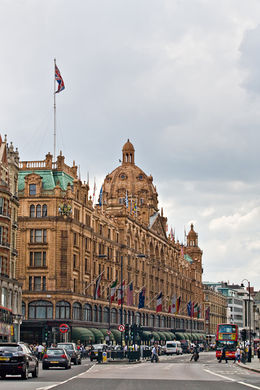
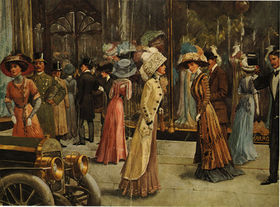
Harrods founder Charles Henry Harrod first set up shop in 1824,at the age of 25, south of the River Thames in Southwark, at 228, Borough High Street. He ran this business, variously listed as a Draper, or Mercer and Haberdasher, certainly until 1831.[3][4][5] During 1825 the business was listed as 'Harrod and Wicking, Linen Drapers, Retail',[6] but this partnership was dissolved at the end of that year.[7] His first grocery business appears to be as ‘Harrod & Co.Grocers’ at 163 Upper Whitecross Street, Clerkenwell, E.C.1., in 1832.[8] In 1834 in London's East End, he established a wholesale grocery in Stepney, at 4, Cable Street, with a special interest in tea. In 1849, to escape the vice of the inner city and to capitalise on trade to the Great Exhibition of 1851 in nearby Hyde Park, Harrod took over a small shop in the district of Knightsbridge, on the site of the current store. Beginning in a single room employing two assistants and a messenger boy, Harrod's son Charles Digby Harrod built the business into a thriving retail operation selling medicines, perfumes, stationery, fruit, and vegetables. Harrods rapidly expanded, acquired the adjoining buildings, and employed one hundred people by 1880.
However, the store's booming fortunes were reversed in early December 1883, when it burnt to the ground. Remarkably, in view of this calamity, Charles Harrod fulfilled all of his commitments to his customers to make Christmas deliveries that year—and made a record profit in the process. In short order, a new building was raised on the same site, and soon Harrods extended credit for the first time to its best customers, among them Oscar Wilde, legendary actors Lillie Langtry and Ellen Terry, Noël Coward, Sigmund Freud, A. A. Milne, and many members of the British Royal Family.
On Wednesday, 16 November 1898, Harrods debuted England's first "moving staircase" (escalator) in their Brompton road stores; the device was actually a woven leather conveyor belt-like unit with a mahogany and "silver plate-glass" balustrade.[9] Nervous customers were offered brandy at the top to revive them after their 'ordeal'. The department store was purchased by the Fayed brothers in 1985.
Recent events
In 2007, Harrods hired a live Egyptian cobra to protect the shoe counter, guarding a £62,000 (€84,880) pair of haute couture ruby-, sapphire- and diamond-encrusted sandals launched by designer Rene Caovilla.[10]
After previously dening that Harrods was for sale, Harrods was sold to Qatar Holdings, the soverign wealth fund of the emirate of Qatar in May 2010. A fortnight previously, Fayed had stated that "People approach us from Kuwait, Saudi Arabia, Qatar. Fair enough. But I put two fingers up to them. It is not for sale. This is not Marks and Spencer or Sainsbury's. It is a special place that gives people pleasure. There is only one Mecca."[11]
The sale was concluded in the early hours of 8 May, when Qatari Prime Minister Hamad bin Jassim bin Jaber Al Thani came to London to finalise the deal, saying that the acquisition of Harrods would add "much value" to the investment portfolio of Qatar Holdings while his deputy, Hussain Ali Al-Abdulla, called it a "landmark transaction".[12] A spokesman for Fayed said "in reaching the decision to retire, [Fayed] wished to ensure that the legacy and traditions that he has built up in Harrods would be continued."[12] Harrods was sold for £1.5 billion, half of the sale will be used to pay bank debts of £625 million.[13]
Fayed later revealed in an interview that he decided to sell Harrods following the difficulty in getting his dividend approved by the trustee of the Harrods pension fund. Fayed said "I'm here every day, I can't take my profit because I have to take a permission of those bloody idiots...I say is this right? Is this logic? Somebody like me? I run a business and I need to take bloody fucking trustee's permission to take my profit"[14] Fayed was appointed honorary chairman of Harrods, a position he will hold for at least six months.[14]
Significant event timeline
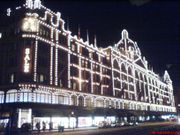
- 1824: Charles Henry Harrod starts his first business as a Draper, at 228, Borough High Street, Southwark, London.
- 1834: Charles Henry Harrod (1799–1885) founds a wholesale grocery in Stepney, East London
- 1849: Harrods moves to the Knightsbridge area of London, near Hyde Park
- 1861: Harrods undergoes a transformation when it was taken over by Harrod's son, Charles Digby Harrod (1841–1905)
- 1883: On 6 December, fire guts the shop buildings, giving the family the opportunity to rebuild on a grander scale
- 1889: Charles Digby Harrod retires, and Harrods shares are floated on the London Stock Exchange under the name Harrod's Stores Limited
- 1905: Begun in 1894, the present building is completed to the design of architect Charles William Stephens.
- 1914: Harrods opens its first and only foreign branch in Buenos Aires, Argentina. It became independent of Harrods in the late 1940s but still traded under the Harrods name usable only in Argentina Harrods Buenos Aires.
- 1914: Harrods buys the Regent Street department store Dickins & Jones.
- 1919: Harrods buys the Manchester department store, Kendals; it took on the Harrods name for a short time in the 1920s, but the name was changed back to Kendals following protests from staff and customers.
- 1959: The British department store holding company, House of Fraser, buys Harrods.
- 1969: Christian the lion was bought by John Rendall and Anthony 'Ace' Bourke. The lion was set free in Kenya after reaching maturity.
- 1983: A terrorist attack by the Provisional IRA outside the Knightsbridge store kills six people.
- 1985: The Fayed brothers buy the store for £615 million.[12]
- 1986: The small town of Otorohanga in New Zealand briefly changed its name to Harrodsville in response to legal threats made by Mohamed Fayed against a person with the surname of Harrod, who had used the name "Harrod's" for his shop. Other town businesses changed their store name to Harrod's in support, and the resultant lampooning in the British press led to Fayed dropping the legal action.
- 1990: A Harrods shop opens onboard the RMS Queen Mary in Long Beach, California, which was then owned by the Walt Disney Company. Harrods gives right to Duty Free International for a license to operate a Harrods Signature Shop at Toronto Pearson International Airport's Terminal 3 (closed shortly after)[15]
- 1994: The relationship between House of Fraser and Harrods is severed. Harrods remains under the ownership of the Fayed family, and House of Fraser is floated on the stock exchange.
- 1997: The British court issues an injunction to restrain the Buenos Aires Harrods store from trading under the Harrods name.
- 2000: A Harrods shop opens onboard the RMS Queen Elizabeth 2, owned by the Cunard Line.
- 2006: The Harrods "102" store opens opposite the main store on Brompton Road; it features concessions like Krispy Kreme and Yo! Sushi, as well as florists, a herbalist, a masseur, and an oxygen spa.
- 2006: Omar Fayed, Mohamed's youngest son, joins the Harrods board.
- 2010: Qatar Holdings become the new owners of Harrods, after Fayed announces he has sold the store. It had been reported that Qatar Holdings paid £1.5 billion for the Knightsbridge store, in a deal signed in the early hours of 8 May 2010.[12]
- 2010: Harrods looks at the possibility of expanding to China and opening a new store in Shanghai. Michael Ward, managing director of Harrods cited Chinese shoppers in Harrods is increasing and the average spend by a Chinese shopper is three times that of the average American.[16]
Products and services
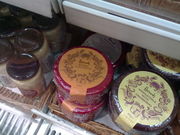
The store's 330 departments offer a wide range of products and services. Products on offer include clothing for every sort of customer (women, men, children, and infants), electronics, jewellery, sporting gear, bridal trousseau, pets and pet accessories, toys, food and drink, health and beauty items, packaged gifts, stationery, housewares, home appliances, furniture, and much more.
A representative sample of store services includes 32 restaurants, serving everything from high tea to tapas to pub food to haute cuisine; a personal shopping-assistance programme known as "By Appointment"; a watch repair service; a tailor; a dispensing pharmacy; a beauty spa and salon; a barbers shop; Harrods Financial Services; Harrods Bank; Ella Jade Bathroom Planning and Design Service; private events planning and catering; food delivery; a wine steward; bespoke "picnic" hampers and gift boxes; bespoke cakes; and bespoke fragrance formulations.
Up to 300,000 customers visit the store on peak days, comprising the highest proportion of customers from non-English speaking countries of any department store in London. More than five thousand staff from over fifty different countries work at Harrods.
There are also a number of concessions opposite the main store on Brompton Road in 'Harrods 102' such as Turnbull & Asser, HMV, Waterstones, Krispy Kreme and David Clulow Opticians.
As of the 15 October 2009, Harrods Bank has started selling gold bars and coins that customers can buy "off the shelf". The gold products range from 1 g to 12.5 kg, and can be purchased within Harrods Bank. They also offer storage services, as well as the ability to sell back gold to Harrods in the future.[17]
Royal warrants
Harrods was the holder of royal warrants from:
- Queen Elizabeth II for Provisions and Household Goods
- The Duke of Edinburgh as Outfitters
- The Prince of Wales as Outfitters and Saddlers
- The Queen Mother, now deceased, for China and Glass
Harrods had held The Duke of Edinburgh's warrant since 1956, but it was rescinded by Prince Philip on 21 December 2001 because of a "significant decline in the trading relationship" between the duke and the store.
Fayed then pre-emptively removed all the royal coats of arms that had been prominently displayed by the business, even though other warrants were yet to expire or be withdrawn. None of the royal grantors of warrants had spent any money at Harrods since 1997, the year Diana, Princess of Wales, died.
Memorials
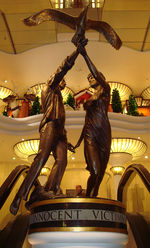

Since the deaths of Diana, Princess of Wales, and Dodi Fayed, Mohamed Fayed's son, two memorials commissioned by Fayed have been erected inside Harrods to the couple. The first, unveiled on 12 April 1998, consists of photographs of the two behind a pyramid-shaped display that holds a wine glass smudged with lipstick from Diana's last dinner as well as what is described as an engagement ring Dodi purchased the day before they died.[18]
The second memorial, unveiled in 2005 and located by the Egyptian escalator at door three is titled "Innocent Victims", is a bronze statue of the two dancing on a beach beneath the wings of an albatross. The albatross is a bird that is said to symbolise the "Holy Spirit".[19] The sculpture was created by 80 year old Bill Mitchell who is a close friend of Fayed and has been the artistic design advisor to Harrods for 40 years. Mr. Fayed said he wanted to keep the pair's "spirit alive" through the statue.[20]
After the death of Michael Jackson, Fayed announced that they had already been discussing plans to build a memorial statue of the singer.[21]
Dress code
Since 1989 Harrods has a dress code policy[22] and has turned away several people who it believes are not dressed appropriately. These include a soldier in uniform,[23] a scout troop,[24] a woman with a mohican hair cut,[24] a fifteen stone woman[24] and the FC Shakhtar Donetsk first team.[24]
Criticism
Harrods and Mohamed Fayed have been criticised for selling real animal fur with regular protests organised outside Harrods.[25] Harrods is the only department store in the UK that has continued to sell fur.[26] Harrods was sharply criticised in 2004 by the Hindu community for marketing a line of feminine underwear (designed by Roberto Cavalli) which featured the images of South-Asian goddesses. The line was eventually withdrawn and formal apologies were made.[27]
Further reading
- Chris Bennett and Colin Cameron (2000-02-07). Behind the Scenes at Harrods. Andre Deutsch. ISBN 0-233-99617-6.
- Tim Dale (November 1986). Harrods: The Store and the Legend. Pan. ISBN 0-330-29800-3.
See also
- Harrods Buenos Aires
References
Notes:
- ↑ Clegg, Alicia (13 December 2005). "Hot Shops: Retail Revamps". Businessweek.com. http://www.businessweek.com/innovate/content/dec2005/id20051213_744054.htm. Retrieved 26 June 2009.
- ↑ fayed-020.htm FACTBOX-previous Harrods owner Mohamed al-Fayed
- ↑ Rate Books April 1824 to April 1831 held at Local History Library, Borough High Street, Southwark, London.
- ↑ 1830 Critchett’s Directory, London.
- ↑ 1832 Robson’s Directory
- ↑ Pigot’s Directory of 1826-27
- ↑ http://www.london-gazette.co.uk/search. Issue 18210, published on the 10th. January, 1826, page 57
- ↑ 1832 Robson's Directory
- ↑ "The First Moving Staircase in England." The Drapers' Record, 19 Nov. 1898: 465.
- ↑ "London's Harrods hires cobra to guard £62,000 shoes". Rawstory.com. 10 September 2007. http://rawstory.com/news/afp/London_x92_s_Harrods_hires_cobra_to_09102007.html. Retrieved 26 June 2009.
- ↑ Qatar, the tiny Gulf state that bought the world. Independent 11 May 2010.
- ↑ 12.0 12.1 12.2 12.3 "Mohammed Fayed sells Harrods store to Qatar Holdings". BBC News (BBC). 8 May 2010. http://news.bbc.co.uk/1/hi/business/8669657.stm. Retrieved 8 May 2010.
- ↑ Why Al-Fayed sold Harrods, for £1.5 billion. This Is Money 10 May 2010.
- ↑ 14.0 14.1 Mohammed Fayed: Why I Sold Harrods. Evening Standard 27 May 2010.
- ↑ http://www.highbeam.com/doc/1G1-8083788.html
- ↑ http://www.guardian.co.uk/business/2010/jul/08/harrods-shanghai-china-london
- ↑ "Harrods Starts Selling Gold Bars". The London Insider. 16 October 2008. http://www.london-insider.co.uk/2009/10/harrods-starts-selling-gold-bars-ingots-coins/. Retrieved 16 October 2009.
- ↑ Rick Steves, Getting Up To Snuff In London, /www.ricksteves.com.
- ↑ Harrods unveils Diana, Dodi statue, CNN.com, 1 September 2005.
- ↑ "Diana bronze unveiled at Harrods". BBC News (BBC). 1 September 2005. http://news.bbc.co.uk/1/hi/england/london/4204364.stm. Retrieved 8 May 2010.
- ↑ "Michael Jackson memorial statue planned for Harrods, says Mohamed Fayed". The Daily Telegraph (London: Telegraph Media Group). 29 June 2009. http://www.telegraph.co.uk/culture/music/michael-jackson/5651456/Michael-Jackson-memorial-statue-planned-for-Harrods-says-Mohamed-Fayed.html. Retrieved 26 June 2009.
- ↑ Don't come as you are: There is only Harrods dress code. The Independent 18 July 1994.
- ↑ Harrods bans soldiers on Poppy Day. Daily Mail 18 November 2006.
- ↑ 24.0 24.1 24.2 24.3 'Harrods bars' Hampshire scouts wearing woggles. BBC News 18 March 2010.
- ↑ "Harrods fur protests". Vegies.org.uk. 27 June 2009. http://www.veggies.org.uk/event.php?ref=782. Retrieved 26 June 2009.
- ↑ "The Coalition to Abolish the Fur Trade". Caft.org.uk. http://www.caft.org.uk/harrods/harrods.htm. Retrieved 2009-06-26.
- ↑ "Harrods apology over Hindu bikinis". BBC News (BBC). 9 June 2004. http://news.bbc.co.uk/2/hi/south_asia/3790315.stm. Retrieved 9 June 2004.
References:
- Guinness World Records 2007, published by Guinness (8 August 2006), ISBN 978-1904994121
External links
- Harrods website
- Harrods Aviation
- Harrods Estates
- Harrods store elevation
- Mohamed al-Fayed interview Harrods Owner
|
|||||